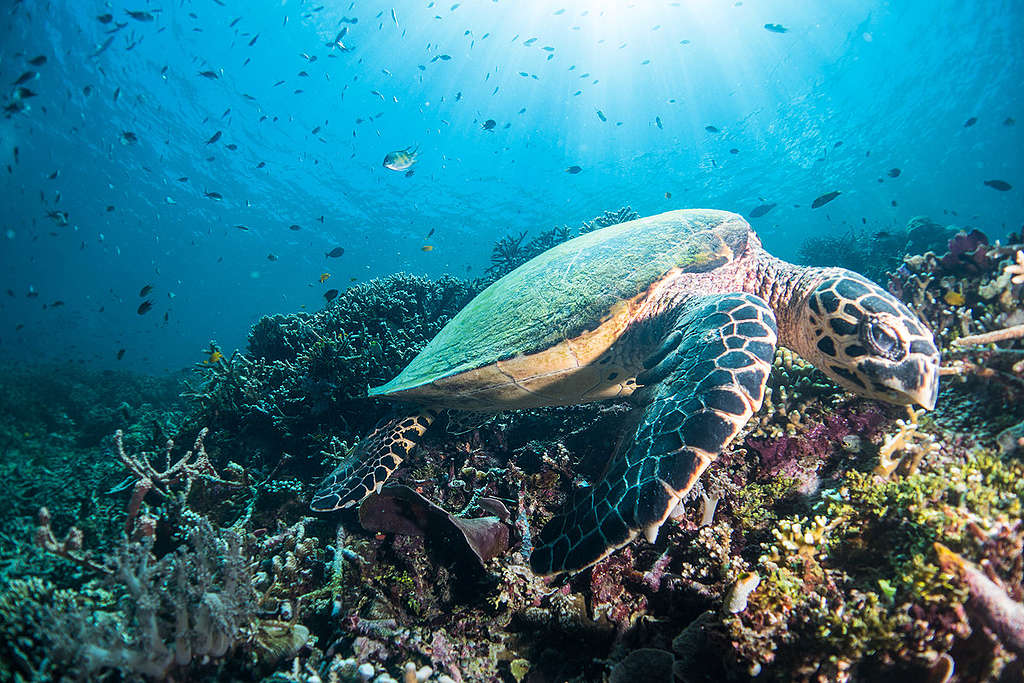Jakarta, Indonesia — Twenty (20) Indonesian manning agencies and 26 fishing companies from China Mainland, Hong Kong, Taiwan, Cote d’Ivoire and Nauru are alleged to have been involved in forced labour practices towards Indonesian migrant fishers, as analysed in a new report by Greenpeace Southeast Asia (GPSEA) in collaboration with the Indonesian migrant workers union, Serikat Buruh Migran Indonesia (SBMI).
“Forced Labour at Sea: The Case of Indonesian Migrant Fishers”, looked at complaints from Indonesian migrant fishers filed with SBMI from May 2019 to June 2020 (13 months) to highlight the patterns and types of forced labour accusations on distant water fishing fleets.[1] Through examination of documents, interviews with complainants, and cross referencing with relevant media reports, Greenpeace Southeast Asia identified the top forced labour indicators to include withholding of wages (87%), abusive working and living conditions (82%), deception (80%), and abuse of vulnerability (67%).
In an interview with Mr. M who worked on the Zhou You 905 vessel, he reported that his salary was not in accordance with his work contract. After working at sea for 11 months, he says he only received IDR 8,800,000 ($615USD) with an element of intimidation made.
“The person who received the money was my wife and she had to sign it with a contract that I had signed, because the salary that I signed in my sea work agreement book did not match what was signed by my wife,” stated Mr. M.
Other complaints included transhipment suggesting that migrant fishers were often at sea for long periods of time.
“We never went ashore at all, not even for fuel oil. All transactions took place in the middle of the sea. For the shark fins that were dried out, some were taken to the collecting vessel. Not packed, but already dried, tied with ropes and then thrown in the collecting vessel,” stated Mr. A, who worked on the Hanrong 363 vessel.
Greenpeace Southeast Asia reached out to the companies implicated in the reports. Only three companies [2] responded to our opportunity to comment and have denied the allegations.
“Alleged cases of forced labour to migrant fishers have been well documented over the years with no signs of improving. In fact we’re seeing cases and complaints increase,” said Ephraim Batungbacal, Regional Oceans Research Coordinator for Greenpeace Southeast Asia.
“The current measures by ASEAN governments are not enough. What we need is meaningful collaboration and sharing of information among key government and non government actors, labour and fisheries administrations, the private sector, migrant fishers and their organisations, among others. We need to pressure all relevant governments to establish immediate policies to end modern slavery at sea and strengthen the fight against illegal, unreported and unregulated (IUU) fishing.”
The Forced Labour at Sea report is a follow up to 2019’s “Seabound: The Journey to Modern Slavery on the High Seas“. GPSEA compared complaints with complete documentation from Seabound and found that for this report there were more reported cases of forced labour at 62 (13 months, May 2019 – June 2020) compared to 34 (eight months, December 2018 – July 2019). None of the complaints from Seabound overlap with this report. Similarly, the number of vessels of interest are more at 45 compared to 13.
“Whether through increased awareness by migrant fishers to report, or indeed, more prevalent cases of forced labour, these numbers suggest vulnerable migrant fishers continue to be taken advantage of,” said Ephraim Batungbacal.
“Those involved in forced labour must be prosecuted and dealt swiftly at every segment of the supply chain. Forced labour and cheap labour is a ‘hidden cost’ in the seafood industry, but we cannot hide this anymore.”
Based on his experience in providing legal assistance and advocacy for Indonesian migrant fishers and victims of human rights abuses, Hariyanto, chairman of the SBMI, said he deplored the law enforcement officers’ lack of commitment. According to SBMI’s report, there are many cases filed since 2014 that have not been addressed as of now.
“Law enforcement officers in Indonesia must adhere to the Law No. 21/2007 on Human Trafficking Act and therefore ensure restitution for victims and that the perpetrators are sent to jail,” he added.
“What’s been happening is that it takes very long for one case to finish and it makes the victims even more vulnerable. They are tired and the legal proceedings stray them further from their restitution rights. In the end, they become victims twice.”
Download the “Forced Labour at Sea: The Case of Indonesian Migrant Fishers” report here.
Notes to Editor:
[1] From the 118 cases filed from May 2019 to June 2020, only 62 cases with complete complaint documentation were included in the report.
[2] Zhoushan Ningtai Ocean Fisheries Co., Ltd., Zhoushan Xinhai Fishery Co. Ltd. and Yong Feng Fishery Co. Ltd.
Contacts:
Ephraim Batungbacal, Regional Oceans Research Coordinator, Greenpeace Southeast Asia, [email protected], +63-999-993-2058
Vela Andapita, Media Campaigner, Greenpeace Southeast Asia, [email protected], +6281-7575-9449

The threats facing our oceans are getting more urgent, find out how you can make a difference
